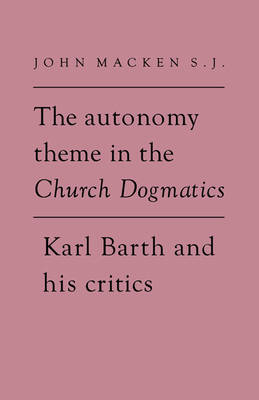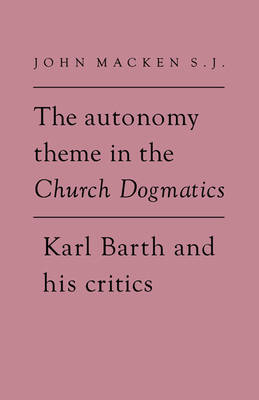
- Afhalen na 1 uur in een winkel met voorraad
- Gratis thuislevering in België vanaf € 30
- Ruim aanbod met 7 miljoen producten
- Afhalen na 1 uur in een winkel met voorraad
- Gratis thuislevering in België vanaf € 30
- Ruim aanbod met 7 miljoen producten
Zoeken
The Autonomy Theme in the Church Dogmatics
Karl Barth and His Critics
John Macken
Hardcover | Engels
€ 172,95
+ 345 punten
Uitvoering
Omschrijving
Karl Barth, perhaps the greatest Protestant theologian of this century, with the directness that was characteristic of him, faced not only the question of autonomy but also the theological answers that liberals had attempted to provide to it. His dissatisfaction with their answers led him to start a theological counterrevolution, which (until recently) was thought to adopt a negative answer to the question of autonomy. In this careful study Father Macken shows that a major reinterpretation of Barth's thought in this regard has been taking place since 1968, and that--far from being an opponent of human freedom in relation to God--Barth is now thought to have proposed a positive account of human autonomy as his theology developed. This notable book, written by a Roman Catholic theologian, is the first work in English to investigate the thought of Karl Barth on the autonomy theme. Set as it is in the wider context of the modern Christian response to questions raised by the Enlightenment, it provides a comprehensive and useful guide to the "new wave" of German Barth interpretation.
Specificaties
Betrokkenen
- Auteur(s):
- Uitgeverij:
Inhoud
- Aantal bladzijden:
- 244
- Taal:
- Engels
Eigenschappen
- Productcode (EAN):
- 9780521346269
- Verschijningsdatum:
- 27/04/1990
- Uitvoering:
- Hardcover
- Formaat:
- Genaaid
- Afmetingen:
- 140 mm x 216 mm
- Gewicht:
- 458 g

Alleen bij Standaard Boekhandel
+ 345 punten op je klantenkaart van Standaard Boekhandel
Beoordelingen
We publiceren alleen reviews die voldoen aan de voorwaarden voor reviews. Bekijk onze voorwaarden voor reviews.








